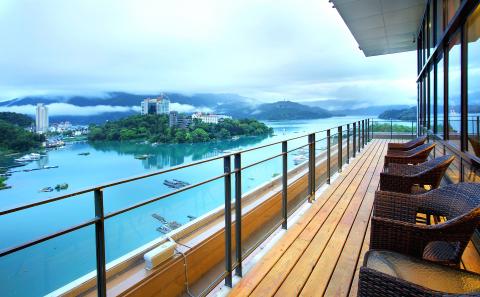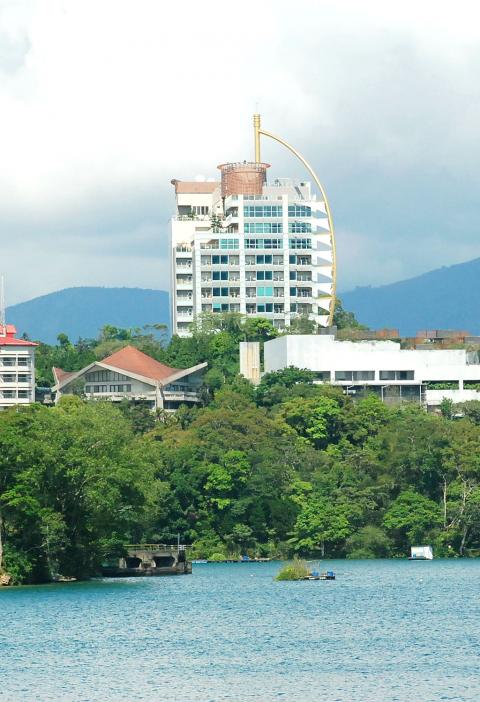The hotel room has a balcony overlooking Sun Moon Lake in Nantou County. Relaxing on the chair and flipping through magazines is an ideal way to soak in the breathtaking scenery of one of Taiwan’s most renowned tourist spots.
When you retreat to the hot spring-style bathtub, you can check out the variety shows on the wall-mounted flat-screen TV.
However, if you think you are in the famous five-star hotel, the Lalu (涵碧樓), and all these luxuries come at a price of more than NT$10,000 for a single night stay, think again.

Photo provided courtesy of Sun Moon Lake Hotel
This is one of the 106 rooms at the Sun Moon Lake Hotel (SMLH, 日月潭大飯店), where the average prices are half of those at the Lalu.
SMLH flung its doors open to the public on March 22, with 80 percent of the rooms offering a lake view.
“Taiwan has been in the pursuit of top-class hotels where guests have to burn a hole in their pockets to enjoy the service, but the middle class is where the most spending power lies,” said Chang Chung-jun (張俊忠), assistant general manager of SMLH. “We want to change that. SMLH is a hotel where people can afford to stay and warm service is not ignored.”

Photo: Lin Ming-hung, Taipei Times
Chen Lung-shui (陳龍水), the owner of SMLH and chairman of textile trading firm San Yuan Industrial Corp (三遠實業), has traveled to more than 50 countries for business purposes, and is therefore quite particular about hotel accommodation.
He decided to enter the recreational and hospitality industry with the first investment in SMLH three years ago after a friend brought up the idea of opening a hotel in the popular Nantou tourist hotspot.
“The chairman was convinced that he would be able to pull this off if SMLH had a strategic location, offered spectacular scenery of the Sun Moon Lake and was run by a team of professional management executives,” Chang said.
Chen forked out NT$800 million (US$26 million) for the hotel project that became the SMLH — a mid-priced boutique hotel on the lake that claims to offer attentive service and lake-view rooms to rival the Lalu’s.
SMLH is not alone in vying for a slice of the lake’s growing tourism pie. A surge of Chinese tourists after Taiwan relaxed regulations for visiting Chinese, has caught the attention of many potential investors.
During China’s Golden Holiday from Oct. 1 to Oct. 7, as many as 20,206 Chinese visited Taiwan. The number nearly doubled from the same period last year, the Taiwan Tourism Board said.
The board said that the top three Taiwan destinations for Chinese during the Golden Holiday were Sun Moon Lake, Taipei 101 and Sizihwan Bay (西子灣) in Kaohsiung, in that order.
Another hotel that has joined SMLH in the competition is the Wen Wan Resort (日月行館), a five-star hotel that opened in July.
Walk-in room rates for Wen Wan range from NT$20,000 to NT$320,000.
Wen Wan is the first BOT (built-operate-transfer) project from the Nantou County Government and uses the former parking space at the highest spot on Hanbi Peninsula (涵碧半島). The spot was earlier occupied by former president Chiang Kai-shek’s residence (蔣公行館), which was ruined during the 921 Earthquake in 1999 and rebuilt as a parking lot.
Tuck-More Biotechnology Co (桐核麥) won the BOT project, which cost NT$2 billion for 30-year rights to run the Wen Wan.
The owner of the resort shares one trait with Chen in that the project is also Tuck-More’s first inroads into the hospitality industry.
Initially from a village in Taichung County, the resort’s chairman Tang Wen-wan (湯文萬) founded biotech firm Tuck-More in 1999 to produce beverages and products with polysaccharide — a bio--organism found in mushrooms that is said to be good for health.
Many have been wowed by the facilities at the Wen Wan.
For one, it has an observatory deck on the 11th floor, where guests can take in the lake view from a transparent floor 60m up in the air. All of its 92 rooms tout a 270-degree panoramic view of the lake and guests can enjoy a private moment while using the gold-foiled toilet seats and sinks.
On the 12th floor is an infinity swimming pool that appears extend into Sun Moon Lake. Swimmers can order drinks at the pool bar and enjoy them without leaving the pool.
The most eye-catching feature, however, is the D-shaped mast on the hotel’s exterior, which has become a landmark at the lake.
The structure is in the Guinness Book of World Records thanks to the 479.5 ounces (15kg) of foiled gold used to create the mast, whose curve length is 61m with a center pillar length of 12m.
An industry source, who asked not to be named, quoted data from the Nantou Tourism Board that the average cost, including discounts and promotions, of a one-night stay at the Wen Wan was NT$13,000 in August. The cost for the Lalu was NT$10,000, while guests at the Fleur De Chine (日月潭雲品) and SMLH paid an average of NT$7,000 and NT$4,500 respectively.
Meanwhile, the occupancy rate at the Wen Wan last month was 20 percent, up from 15 percent in August, according to the hotel’s data.
Occupancy rates for the Lalu and SMLH were more than 70 percent and 50 percent respectively for the past two months.
Despite a lower-than-expected occupancy rate, the Wen Wan said it is confident that a niche segment of guests will be drawn by its luxury services.
“We are eyeing the top of the pyramid,” marketing and communications assistant manager Anko Chen (陳玉菲) said.
By “the top of the pyramid,” Chen was referring to members of a club of Ferrari luxury sports car enthusiasts, who “fell in love with the Wen Wan after their first meal at the resort and decided to stay there for their monthly gathering.”
Other major VIPs are Chinese government dignitaries, who think of the Wen Wan as their No. 1 choice when visiting the lake, she said.

Application-specific integrated circuit designer Faraday Technology Corp (智原) yesterday said that although revenue this quarter would decline 30 percent from last quarter, it retained its full-year forecast of revenue growth of 100 percent. The company attributed the quarterly drop to a slowdown in customers’ production of chips using Faraday’s advanced packaging technology. The company is still confident about its revenue growth this year, given its strong “design-win” — or the projects it won to help customers design their chips, Faraday president Steve Wang (王國雍) told an online earnings conference. “The design-win this year is better than we expected. We believe we will win

Intel Corp chief executive officer Lip-Bu Tan (陳立武) is expected to meet with Taiwanese suppliers next month in conjunction with the opening of the Computex Taipei trade show, supply chain sources said on Monday. The visit, the first for Tan to Taiwan since assuming his new post last month, would be aimed at enhancing Intel’s ties with suppliers in Taiwan as he attempts to help turn around the struggling US chipmaker, the sources said. Tan is to hold a banquet to celebrate Intel’s 40-year presence in Taiwan before Computex opens on May 20 and invite dozens of Taiwanese suppliers to exchange views

Chizuko Kimura has become the first female sushi chef in the world to win a Michelin star, fulfilling a promise she made to her dying husband to continue his legacy. The 54-year-old Japanese chef regained the Michelin star her late husband, Shunei Kimura, won three years ago for their Sushi Shunei restaurant in Paris. For Shunei Kimura, the star was a dream come true. However, the joy was short-lived. He died from cancer just three months later in June 2022. He was 65. The following year, the restaurant in the heart of Montmartre lost its star rating. Chizuko Kimura insisted that the new star is still down

While China’s leaders use their economic and political might to fight US President Donald Trump’s trade war “to the end,” its army of social media soldiers are embarking on a more humorous campaign online. Trump’s tariff blitz has seen Washington and Beijing impose eye-watering duties on imports from the other, fanning a standoff between the economic superpowers that has sparked global recession fears and sent markets into a tailspin. Trump says his policy is a response to years of being “ripped off” by other countries and aims to bring manufacturing to the US, forcing companies to employ US workers. However, China’s online warriors